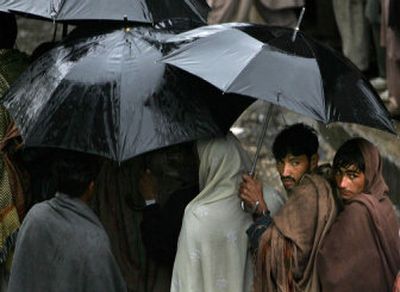Death estimate rises as rains fall

BALAKOT, Pakistan – Pakistani officials predicted Sunday that many more thousands of dead would be found in earthquake-ravaged Kashmir as heavy rains in the Himalayan region drenched homeless survivors in mud and misery.
The latest estimate would raise the death toll from the magnitude-7.6 quake in the mountains of northern Pakistan and India to at least 54,000 – a jump of more than 13,000 from the official count of known dead.
A spokesman for the prime minister of the region warned that the cold and wet could cause further deaths among the 2 million or so people believed to be homeless.
About a fifth of the villages in the quake zone remained cut off eight days after the tremor turned villages scattered across lush mountainsides into death traps, and the bad weather over Kashmir halted aid flights by helicopters.
Government officials in Islamabad said early Sunday that 39,422 people were confirmed killed in all of Pakistan – at least 26,422 dead in the Pakistani portion of Kashmir and another 13,000 in North West Frontier Province.
But later Sunday a spokesman for the state government chief in the Pakistani portion of Kashmir said the death toll in that region alone is believed to be “not less than 40,000.” This would mean the quake killed more than 53,000 in all of Pakistan.
With another 1,350 deaths reported in India’s part of Kashmir, that brings the quake’s death toll to more than 54,000.
Abdul Khaliq Wasi, a spokesman for Kashmiri Prime Minister Sikandar Hayat Khan, stressed the 40,000 number for deaths in Pakistani-controlled Kashmir was only “a closest estimate” and did not reflect the number of bodies recovered.
Khan gave an even worse prediction to Pakistan’s Geo television.
“Some people fear that the death toll could be 100,000 and they may be right,” he said.
A precise death toll will be difficult to determine, because many bodies are buried under collapsed buildings and landslides.
“The United Nations is still operating on the government’s official numbers,” said Andrew MacLeod, Humanitarian Affairs officer with the U.N. Coordination and Assessment Team. “There are regions that still have not been reached, and the death toll is not final.”
Maj. Gen. Farooq Ahmed Khan, the Pakistani relief commissioner, voiced fears about the chilly downpours that were making conditions even more miserable for quake survivors forced to live in the open.
“There are bound to be casualties because of bad weather. How much? I don’t know,” Farooq Ahmed Khan said at a news conference.
He said 29,000 tents and 118,000 blankets had been distributed in the quake zone, but he estimated that 100,000 tents were needed. The army said medical supplies such as syringes, painkillers and antibiotics also were scarce.
U.S. State Department official Geoffrey Krassy said many in the quake zone remained cut off from aid.
The military said roads to the valleys of Jehlum, Neelum and Kaghan in Kashmir remained closed by landslides, and it could take several weeks to clear them. In some areas, Pakistani soldiers evacuated injured villagers by carrying them on their backs.
An aid worker with a Pakistani nonprofit was killed Sunday morning when he accidentally walked into the tail rotor of a helicopter as it prepared to leave Balakot to pick up more supplies, state news agency APP reported.
Torrential rain halted airborne relief efforts in Kashmir, where the Pakistani military said a relief helicopter crashed in bad weather late Saturday, killing all six soldiers aboard. The MI-17 transport craft was returning to base after flying relief workers to Bagh, one of the worst-hit towns.